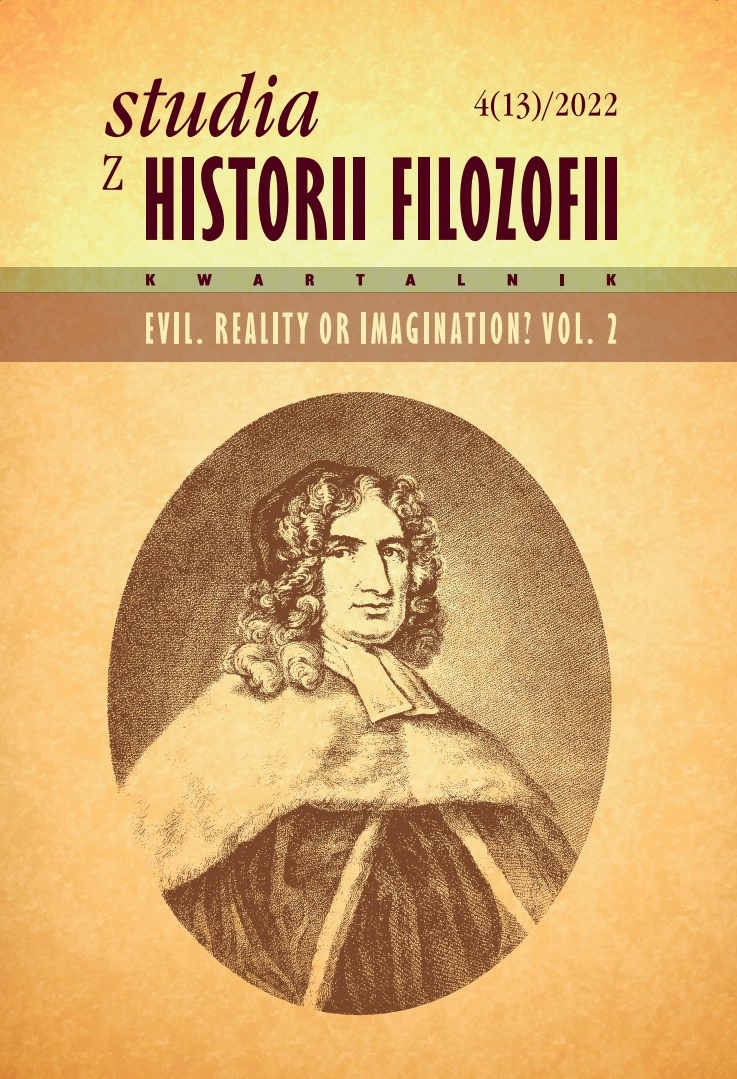Archbishop William King’s Critique of Manichaeism in the Treatise "On the Origin of Evil" (1702)
DOI:
https://doi.org/10.12775/szhf.2022.021Słowa kluczowe
William King (1650–1729), Manichaeism, the origin of evil, theodicyAbstrakt
This paper examines the Irish philosopher, theologian and divine William King’s (1650–1729) discussion of Manichaeism in the essay De Origine Mali (On the Origin of Evil) (1702). King intended to demonstrate that the Manichaeist solution to the problem of the origin of evil, consisting in assuming the existence of two opposite principles of, respectively, good and evil, leaves the problem untouched and, therefore, cannot compete with the orthodox view, according to which the presence of evil, despite appearances to the contrary, is compatible with the one and perfect principle of all creation. Following preliminary remarks about the text, context, and King’s terminology, this paper argues that his criticism is flawed.
Bibliografia
Antognazza Maria Rosa. 2014. “Metaphysical Evil Revisited”. In: New Essays on Leibniz Theodicy, ed. Larry M. Morgensen, Samuel Newlands, 112–134. Oxford: Oxford University Press.
Augustinus Aurelius. 1845. Sancti Aurelii Augustini Hipponensis Episcopi Opera Omnia Usque Adhuc Edita. Tomus Secundus. Venezia: Guiseppe Antonelli.
Bayle Pierre. 1967. Historical and Critical Dictionary: Selections, transl. Richard H. Popkin. Indianapolis: The Bobbs-Merrill Company Inc.
Berman David. 1994. George Berkeley: Idealism and the Man. Oxford: Clarendon Press.
Easton Patricia. 2015. “Sincerity and Skepticism in Pierre Bayle: Navigating the Bayle Enigma”. In: The Battle of Gods and Giants Redux. Papers Presented to Thomas M. Lennon, ed. Patricia Easton, Kurt Smith, 246–261. Leiden: Brill.
Fauske Christopher. 2011. A Political Biography of William King. London–New York: Routledge.
Greenberg Sean. 2008. “Leibniz on King: Freedom and the Project of the ‘Theodicy’”. Studia Leibnitiana 40(2): 205–222.
Hume David. 1998. An Enquiry Concerning the Principles of Morals, ed. Tom L. Beauchamp. Oxford: Oxford University Press.
Hume David. 1998. Principal Writings on Religion Including Dialogues Concerning Natural Religion and The Natural History of Religion, ed. J. C. A. Gaskin. Oxford: Oxford University Press.
King Charles Simeon. 1908. A Great Bishop of Dublin William King. D.D.. 1650–1729. His Autobiography, Family, and a Selection from His Correspondence. London: Longmans, Green, and Co.
King William. 1704. De Origine Mali. Authore Guiliemo King, S. T. D. Episcopo Derensi. Juxta Exemplar Londinense. Bremen: Philipp Gottfried Saurmann.
King William. 1781. An Essay on the Origin of Evil. By Dr. William King, Late Lord Archbishop of Dublin. Translated from the Latin with Notes. To which is added, A Sermon by the Same Author, on the Fall of Man. The Fifth Edition, Revised. By Edmund, Lord Bishop of Carlisle. London: R. Faulder.
Leibniz Gottfried Wilhelm. 1998. Theodicy. Essays on the Goodness of God, the Freedom of Man and the Origin of Evil, ed. Arthur Farrer, transl. E. M. Huggard. Chicago–La Salle: Open Court.
Lennon Thomas Michael. 1999. Reading Bayle. Toronto: University of Toronto Press.
Lugt Mara van der. 2016. Bayle, Jurieu, and the Dictionnaire Historique et Critique. Oxford: Oxford University Press.
Mill John Stuart. 1971. Autobiography. Oxford: Oxford University Press.
Newlands Samuel. 2014. “Hume on Evil”. In: The Oxford Handbook of Hume, ed. Paul Russell, 623–645. Oxford: Oxford University Press.
Newlands Samuel. 2018. “The Problem of Evil”. In: The Routledge Companion to the Seventeenth Century Philosophy, ed. Dan Kaufman, 536–562. London–New York: Routledge.
Richardson Joseph. 2000. “Archbishop William King (1650–1729): ‘Church Tory and State Whig’?”. Eighteenth-Century Ireland / Iris an dá chúltur 15: 54–76.
Videngren Geo. 1965. Mani and Manichaeism. London: Weidenfeld and Nicholson.
Pobrania
Opublikowane
Jak cytować
Numer
Dział
Licencja

Utwór dostępny jest na licencji Creative Commons Uznanie autorstwa – Bez utworów zależnych 4.0 Międzynarodowe.
Statystyki
Liczba wyświetleń i pobrań: 562
Liczba cytowań: 0



